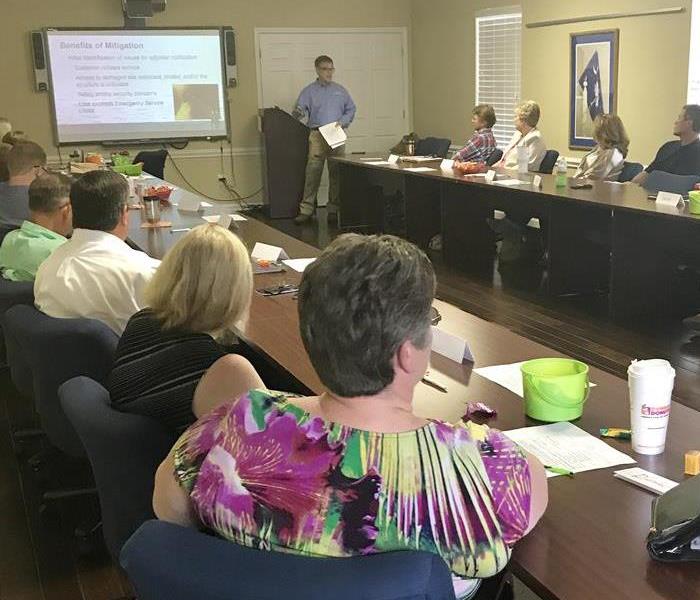Recent General Posts
Cold Weather = Frozen Pipes - Are you Prepared?
1/25/2019 (Permalink)
Living in the South doesn’t always mean warmer weather and Old Man Winter is planning a visit to the Carolinas this weekend - bringing artic air that can be brutal to your water pipes. SERVPRO of Newberry and Laurens Counties want you to be prepared! The best way to prevent frozen pipes is to protect vulnerable pipes with inexpensive, easy-to-install insulation. There are also last-minute preventative measures you can use in a pinch, and if your pipes should freeze, there are safe ways to thaw them before permanent damage occurs. Use these tips to avoid this messy and costly household disaster.
Insulating Your Pipes
It only takes a small amount of time and money to insulate the most exposed sections of your home’s plumbing system. Insulating foam sheaths are available at most hardware stores and they easily attach to pipes with adhesive strips or pipe clamps. Locating your main water line from the point is emerges from the ground to the point where it enters the heated area of your home should be insulated. Locate your main water shut-off valve and make sure it opens and closes easily. In the event of a broken pipe due to freezing the first thing you’ll want to do is close this valve. Insulate any pipes that reach outside the heated environment of your home.
Prevent Frozen Pipes
If you have uninsulated pipes implement these tricks to prevent a disaster. Run a continuous trickle of water from the water fixture farthest from the water main. If your fixture has separate handles for hot and cold slightly open both valves. Open kitchen and bathroom cabinet doors to allow warmer air to circulate around the plumbing. Keep your thermostat set to the same temperature during the day and night.
Be Prepared
Using these simple tools can prevent a water disaster in your home but know if this should happen SERVPRO of Newberry and Laurens Counties are here to help! Like it never even happened!
Power Outages
10/31/2018 (Permalink)
9/18/2018 (Permalink)
Extended power outages may impact the whole community and the economy. A power outage is when the electrical power goes out unexpectedly. A power outage may:
Disrupt communications, water, and transportation.
Close retail businesses, grocery stores, gas stations, ATMs, banks, and other services.
Cause food spoilage and water contamination.
Prevent use of medical devices.
PROTECT YOURSELF DURING A POWER OUTAGE:
Keep freezers and refrigerators closed.
Only use generators outdoors and away from windows.
Do not use a gas stove to heat your home.
Disconnect appliances and electronics to avoid damage from electrical surges.
Have alternate plans for refrigerating medicines or using power-dependent medical devices.
If safe, go to an alternate location for heat or cooling.
Check on neighbors.
HOW TO STAY SAFE WHEN A POWER OUTAGE THREATENS:
Prepare NOW
- Take an inventory of the items you need that rely on electricity.
- Talk to your medical provider about a power outage plan for medical devices powered by electricity and refrigerated medicines. Find out how long medication can be stored at higher temperatures and get specific guidance for any medications that are critical for life.
- Plan for batteries and other alternatives to meet your needs when the power goes out.
- Sign up for local alerts and warning systems. Monitor weather reports.
- Install carbon monoxide detectors with battery backup in central locations on every level of your home.
- Determine whether your home phone will work in a power outage and how long battery backup will last.
- Review the supplies that are available in case of a power outage. Have flashlights with extra batteries for every household member. Have enough nonperishable food and water.
- Use a thermometer in the refrigerator and freezer so that you can know the temperature when the power is restored. Throw out food if the temperature is 40 degrees or higher.
- Keep mobile phones and other electric equipment charged and gas tanks full.
https://www.ready.gov/power-outages
Great tips for Christmas Lights
12/15/2017 (Permalink)
 Don’t leave Christmas lights running when you go to bed at night or when you leave the house.
Don’t leave Christmas lights running when you go to bed at night or when you leave the house.
Newberry and Laurens county houses are all lit up with Christmas lights. It is a beautiful sight to behold. Whether stringing lights across your roof and around your home or using them indoors, take a few moments to run through a quick safety checklist.
- Before you string up a single strand of lights, carefully check them for cracked cords frayed ends or loose connections.
- The combination of shorts in electrical lights and a tinder-dry tree can be deadly. There are 250 Christmas tree fires and 14 related deaths each year, according to the U.S. Fire Administration. So keep your tree well-watered. Not only will it stay fresh and green, but it might also keep your house from burning down.
- Modern lights have fused plugs, preventing sparks in case of a short circuit. Ditch old strands of lights that don’t have fuses and get a set of newer, safer lights.
- Don't connect more than three strands of mini-string sets and a maximum of 50 bulbs for screw-in bulbs.
- If bulbs have burned out, replace them right away, but make sure you use the correct wattage bulbs.
- Water and debris can get into outdoor sockets, so make sure outdoor lights are plugged into a ground fault circuit interrupter outlet to reduce the risk of shorts and shocks. Hire a licensed electrician if you need to install GFCI outlets.
- Keep an eye on extension cords, as they can occasionally overheat. Just touch-test the cord. If it’s hot, unplug it.
- Don’t use tacks, nails or screws to hang lights, which can pierce the cable and become electrified. Use insulated hooks instead.
- When running extension cords along the ground, make sure to elevate plugs and connectors with a brick to keep snow, water and debris out of the connections.
- Tape down any ground-level extensions cords to prevent people from tripping over them.
- Check to make sure lights have been rated by a testing laboratory. You can see a list of federally recognized labs on the OSHA website.
- Not all lights are rated for outdoor use. Indoor lights often have thinner insulation, which can become cracked and damaged when exposed to the elements outdoors. So make sure the ones you string up on the house belong out there.
- Don’t leave Christmas lights running when you go to bed at night or when you leave the house.
- When you put your lights back into storage after the holidays, make sure to place them in a well-sealed container to prevent possible water damage and to block hungry rodents looking to turn the cords into lunch.
These tips will help you stay safe and prevent fires. Of course, if you do have a fire, call 9-1-1. Follow these fire safety tips and call SERVPRO of Newberry and Laurens Counties at (803) 276-0290 if you need help with professional clean-up.
The Importance of Continuing Education
11/13/2017 (Permalink)
 Continuing Education Class held in Laurens, South Carolina
Continuing Education Class held in Laurens, South Carolina
The work place is constantly evolving. Continuing education and constant informal learning is required for everyone to stay current with the latest developments, skills, and new technologies required for their fields.
Today, most professions require continuing education to comply with laws, remain licensed or certified. Continuing education requirements are mandated by State or other licensing body is considered key in staying updated with industry advancements and changes.
Most insurance companies and agencies require their agents to take continuing education courses in topic in which they would like their agents to get well versed in. CE is also a good way for agents to acquire knowledge about new lines of insurance and to expand their business.
SERVPRO offers both credit and noncredit courses for insurance agents, insurance adjusters, real estate professionals and franchise staff. These programs are designed to improve knowledge of emergency mitigation. Courses include:
- Water Damage Restoration
- Fire Damage Restoration
- Understanding Mold in the Restoration Industry
- Restorative Drying for Loss Control
- Mitigation Awareness Response Seminar
(non-credit course)
If you have questions about our next continuing education class, contact the experienced professionals at SERVPRO Newberry and Laurens Counties.
Hurricane Irma Preparation
9/7/2017 (Permalink)
 Hurricane image from space
Hurricane image from space
With Hurricane Irma approaching now is the time to prepare. It only takes one storm to change your life and community. Based on the current trajectory of Hurricane Irma, the primary impact area is Florida and potentially South Carolina and North Carolina.
Even areas well away from the coastline can be threatened by dangerous flooding, destructive winds and tornadoes from these storms.
Determine Your Risk
Hurricanes bring many hazards to U.S. coastlines and inland areas, including storm surge along the coast, inland flooding due to heavy rainfall, tornadoes, strong wind, rip currents and large waves.
Develop an Evacuation Plan
Find out today if you live in a hurricane evacuation zone. Plan where you’ll go and how you would get there. Leave immediately if ordered to evacuate and be sure to plan for your pets.
Assemble Disaster Supplies
Get your supplies before the hurricane hits. Many stores are experiencing shortages. Have enough food and water for each person for at least one week. Be sure to fill your prescriptions and have medicine on hand. Radios, batteries and phone chargers are also must haves. Gas up your vehicle and extra cash on hand.
Get Insurance Checkup
Check in with your insurance agent well beforehand, remember that flood insurance must be obtained separately. Prepare your home/vehicles according to your policy, and know where your insurance documents are located – take them with you if you evacuate. Visit floodsmart.gov for more information.
Strengthen Your Home
There is a lot you can do around your home to help protect it from the strong winds that come with hurricanes. Well ahead of the approaching storm, trim trees on your property, shop for approved window coverings, collect loose outdoor items, secure all doors on you property, and find a safe location for your vehicle.
Help Your Neighbor
Many people rely on the assistance of neighbors before and after hurricanes. Help your neighbors collect the supplies they’ll need before the storm. Assist them with evacuation if ordered to do so or check on them after it’s safe for you to head outside.
Complete your Written Plan
Writing down your plan will help you avoid mistakes when faced with an emergency and ensure everyone in your home is prepared for the next storm.



 24/7 Emergency Service
24/7 Emergency Service


